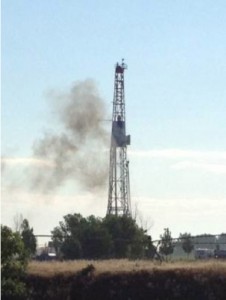 April 18, 2014 08:31 AM UTC
April 18, 2014 08:31 AM UTC

The Grand Junction Sentinel's Charles Ashby reports on passage yesterday of House Bill 14-1297, a bill to study the health impacts of hydraulic fracture drilling ("fracking") in certain affected Front Range counties:
The Colorado House approved a controversial bill Thursday that some Republicans believe is designed to give opponents of hydraulic fracturing fodder to ban the practice in the state…
The measure, HB1297, cleared the House on a 38-27 vote. It calls for a study of the health and “quality of life” impacts of hydraulic fracturing of natural gas wells.
Although the bill, which heads to the Senate for more debate, confines that study to six Front Range counties around the Denver metropolitan area, it is seen by some Republicans as a plan by Democrats to slant it to be anti-fracking.
Interestingly, a single Republican legislator did vote in favor of this bill yesterday, outgoing Rep. Jared Wright of Fruita. We've been hard on Wright over the scandals that nearly cost him election in the first place and appear to have now ended his brief legislative career–not to mention leaving a loaded gun unattended in a Capitol committee hearing room–but we'll be damned if Wright doesn't make perfectly good sense regarding this bill.
“We want to know that we’re not just blindly going forward with technology. That we do it the right way,” Wright said. “I believe it can be done the right way, and frankly, I don’t have a doubt that it is being done the right way. I think the results of this study will be that our operators are doing their jobs and doing it in the careful way that we ask them.”
Rep. Wright tells Ashby that while he shares traditional GOP skepticism about government studies, he has "read this bill in-depth and I feel like it’s well laid-out, and I think it’s certainly the intention that it’s done the right way." Obviously, if Wright is right, Republicans and their energy industry benefactors have nothing to fear from an objective study of the health effects of fracking in Colorado. It will reinforce the argument they make about the safety of the practice. And if Wright is wrong, and fracking is not being done "the right way"…what responsible lawmaker would argue against finding that out?
We ask rhetorically, since 27 Colorado Republicans voted against this bill yesterday.
Subscribe to our monthly newsletter to stay in the loop with regular updates!
Comments